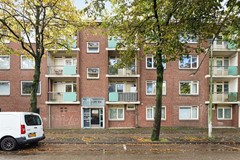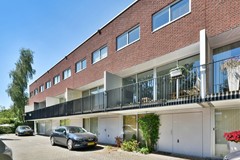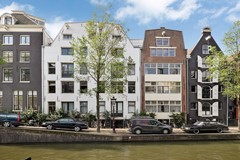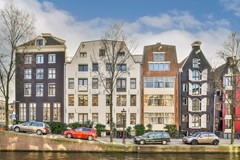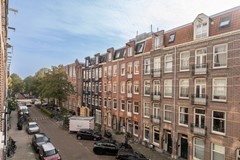Glossary of terms Brokerage
A
Annuity mortgage
With this type of mortgage, the gross monthly payment remains the same during the loan term as long as the interest rate does not change. Over time, however, the composition of the net monthly payment changes; initially, you pay a lot of interest and little principal, but as the term progresses, the composition changes and you start paying off more principal and thus less interest.
Apartment
An apartment is a housing unit in a larger building, such as a flat. An apartment refers to a dwelling on one floor.
Apartment right
Whoever has an apartment right has a share in a building. This share also entitles to the exclusive use of that specific part of a building. Moreover, the apartment right grants the right to use common areas, such as the staircase. The share and the associated right of use together form the apartment right. Unlike membership rights, apartment rights are registered in the Kadaster's registers. This also allows for the possibility to establish a private mortgage. All apartment owners are jointly owners of the entire apartment building or complex. Apartment rights can be for residential units, but also for commercial or office space.
Appraisal
The issuance of a value judgment by an authorized person for a specific purpose (examples of purpose: appraisal for financing, appraisal for succession in case of the death of a natural person, appraisal to determine the real value for making an offer on a property for sale.)
Asking Price
An invitation to make an offer.
Association of Owners
If you own an apartment right, you are, by law, a member of the Association of Owners (VvE). Together with the other owners, the VvE looks after the common interests in and around the apartment complex. The division deed indicates what share you, as the owner, have in the entire building.
B
Bank Guarantee
When a bank issues a bank guarantee, it guarantees that the bank will fulfill what is laid down in the bank guarantee upon request from the beneficiary. The seller usually wants 10% of the sale amount as security. Instead of paying in cash, you can also provide a bank guarantee. Cooling-Off Period (Statutory) If the purchase agreement between the seller and the buyer is on paper, then after receiving a copy, the buyer gets three (working) days of cooling-off period. This means that the buyer can withdraw from the purchase without any reason and completely free of charge within this period. If the buyer wants to withdraw from the purchase, they must have informed the seller before the end of the cooling-off period. This can be done either verbally or in writing.
Basic Rent Price
The monthly rent without service charges and any heating costs.
Bid
The amount offered by a serious candidate along with any conditional clauses, delivery date, and listing of movable and immovable property that belong to this bid. A bid can be made verbally or in writing, but the sale is only binding when it is on paper!
Block Heating
Central heating of several homes, for example in an apartment building, from one boiler house. Block heating thus involves collective natural gas consumption for heat generation for individual space heating. This consumption of natural gas is fully included in the regulatory energy tax. For block heating, energy distribution companies charge consumers a heat price based on the small consumer tariff. This while for consumption above 170,000 m3 gas, the distribution companies pay Gasunie the (lower) large consumer tariff.
Bridging Loan
A loan to bridge the time between the purchase of a new house and the sale of the old house. It makes use of the surplus value of the old house. A bridging loan is usually concluded for a maximum of 6 months.
Building Insurance
Insurance that covers your house (not the contents) against fire, storm, lightning strike, and other disasters. Required for taking out a mortgage.
Bungalow
A bungalow is a dwelling, sometimes a holiday home, consisting of a single living and sleeping area on the ground floor. When there is one room on a second living layer, this type of construction is still considered a bungalow, often called a semi-bungalow. In recent years, many bungalow parks have been built. The bungalows then serve as holiday homes. Most bungalow parks have communal paths and parking spaces. Sometimes there are more facilities that are jointly owned. The maintenance is then managed by an Owners' Association (VvE). The boards of these associations can perform legal acts and conclude contracts to which the individual members are legally bound. Buying a bungalow in a bungalow park sometimes entails an unexpectedly high extra fixed expense in the form of such a VvE.
Business Premises
Office building, retail space, commercial building.
Buying Agent
A real estate agent working on behalf of the house seeker.
C
Cadastre
The cadastre shows how the land in the Netherlands is divided into pieces and to whom each of these pieces of land belongs.
Certification
Anyone can call themselves a real estate agent, but only those who meet certain professional competence requirements can be officially certified by KEMA. Only VastgoedCert certified agents can become members of the NVM professional group.
Closing commission
The amount charged by the bank when closing a mortgage.
Closing costs
All costs incurred when taking out a mortgage, such as mortgage deed, closing commission, appraisal and administrative costs, and the National Mortgage Guarantee (NHG) application costs.
Commercial Building
Building intended for conducting a business.
Commercial Real Estate (CRE)
Real estate intended for business activities.
Commission
Commission or fee for the real estate agent when buying or selling a house. For performing services in an assignment, you owe the real estate agent an agreed amount of money. The amount will be agreed upon and recorded at the time of the assignment. The commission is exclusive of legally owed Value Added Tax (VAT).
Construction Depot
The part of the mortgage amount that is used to pay the installments for the construction or renovation of the house is parked in a construction depot. You receive an interest rate related to your mortgage over this amount. Bills from the builder are paid from the construction depot. The maximum duration of a depot is 2 years.
Construction Financing
The way a new house to be built is paid for. This happens in installments, first the land and then the remaining installments as the construction progresses. The mortgage is closed for the entire amount at the time of purchase and put in depot. The installments are paid from the depot. Interest is received over the amount in depot. This is sometimes lower than the mortgage interest that must be paid over the amounts drawn.
Construction Installments
A new house is often paid for in installments. The parts of the purchase/construction sum that must be paid according to the contract for a new house are the construction installments.
Contact
Address, telephone number, or email address or website information.
Contents Value Meter
Guarantee against underinsurance. This means that the insurer will not appeal to any underinsurance in case of damage.
Convector Pit
This is a heating element that is placed in a narrow space under the floor surface.
Cooling-Off Period
After concluding the purchase agreement, the buyer has a legal cooling-off period of three days. The cooling-off period begins after the buyer and the seller have signed the purchase deed and the buyer has received (a copy of) the deed.
Costs Buyer
The buyer pays the costs of purchasing the home. Costs buyer includes, among other things, the costs for (1) transferring the cadastral right to the new owner in the Mortgage Register of the Land Registry; (2) 2% transfer tax (1999 rate); (3) notary fees for passing the deed of delivery.
D
Daily Interest Rate
The interest rate that applies to new mortgages at that moment.
Death Coverage
Most mortgage providers require that the risk of death of the main breadwinner is covered. If the main breadwinner dies, this can cause financial problems for the remaining partner. A life insurance policy pays out an amount in the event of death. This amount is then used to repay (part of) the mortgage.
Deed
A deed is a notarial document in which matters are recorded. Deeds you may encounter when buying a house include those in which the transfer of a house or a mortgage is recorded.
Deed of Delivery
A notarial deed in which the real estate, in this case, the house, is transferred.
Delivery
Delivery is split into two parts. At the legal delivery, the parcel is put in the buyer's name. This is done by signing the deed of delivery at the notary. Also known as the transfer deed. The actual delivery takes place when the keys are handed over.
Deposit
A down payment made by the buyer that may be included in the purchase contract. The amount usually corresponds to the penalty that you as the buyer must pay if you cannot meet the obligations. The deposit can be paid with a bank guarantee.
Deregulated Rent Prices
The rent price of your home is deregulated in two cases. Firstly, if you have moved into a home on or after July 1, 1994, with a rent price above the then applicable rent subsidy limit. Secondly, if you are a tenant of an independent new construction home (not a room) that was first occupied on or after July 1, 1989, with a rent price above the rent subsidy limit of that particular year. The rent subsidy limit is adjusted every year on July 1. The rent subsidy limit as of July 1, 2003, is euro 585.24.
Deregulated Rental Property
A rental property where the rent according to the points system can be higher than a certain maximum. For a deregulated rental property, there is no maximum rent price.
Development
Developing real estate for sale or rent
District Heating
A heating system where heat and sometimes also hot water is brought from a central point to homes in a neighborhood through a network of pipes. The homes then do not have their own boiler.
Dwellings
House, apartment, etc.
E
Early Repayment Fee
An amount charged when mortgage payments are not made on time. You also pay an early repayment fee when you repay more than the allowed percentage prematurely.
Economic Value
The amount a property would fetch if sold under optimal conditions (also known as the private or free sale value).
Effective Interest Rate
The effective interest rate shows the actual cost price of the mortgage per year. The interest rate you actually pay. In calculating the effective interest rate, in addition to the nominal interest rate, account is also taken of any closing costs, the timing of payments (at the beginning or end of the month), and the number of payments per year (every month, every quarter, etc.). Also referred to as gross actual interest.
Execution Value
The execution value is the appraised sale price of a house in a forced sale. Usually, this amount is 75% to 90% of the value in a free sale.
Expat
Someone who works abroad for an extended period.
Expiration Date
The end date of a contract, for example, the end of a mortgage contract or an interest rate fixed period.
F
Financing Costs
Costs incurred in obtaining a mortgage, such as appraisal costs, mortgage deed costs, and National Mortgage Guarantee costs.
Fixed Interest Period
The period you have agreed with the lender during which your mortgage interest rate remains unchanged. Normally, the interest rate is higher the longer the chosen fixed interest period is.
Flat
A building with multiple floors (stories).
Floor
A floor or story is a layer of a building.
Free On Name
If you buy a house ‘free on name’, then broker fees, notary fees, and VAT or transfer tax are included in the purchase price.
Free Sale Value
The value that the highest bidder would give for a house in a non-forced sale. This is also known as the economic or private sale value.
Funda
The website (www.funda.nl) where properties sold by NVM real estate agents are listed.
G
General Terms and Conditions
Conditions under which a company operates.
Green Power
Green power is electricity generated from sustainable energy sources. There are various ways in which green power can be generated, for example, using wind, with wind turbines water turbines operating at a lock in a river burning biomass, for example, pruning waste or construction waste using solar energy, solar power, burning waste in waste incineration plants, geothermal energy, wave energy (under development) tidal energy. For the next 20 to 30 years, wind turbines are the only technology with which a lot of green power can be generated. Almost all experts expect that electricity from the sun, with solar panels, will still take 20 to 30 years. It will take that long before the solar panels have become cheap enough for the electricity to compete in price with electricity from wind or conventional power plants that burn natural gas, coal, or biomass. In 2007, European experts predicted that solar power could fully compete with market prices of conventionally generated electricity from 2015 or 2017. Green power can also come from old-fashioned power plants. In these, mainly natural gas or coal is burned. If some biomass is mixed with the coal, part of the electricity can be sold as green power. The idea behind green power is to reduce the emission of carbon dioxide (CO2) and other harmful emissions (NOx, SO2, soot, ...) to prevent the greenhouse effect from increasing. Because green power is inexhaustible, it will also be available for future generations. This is not necessarily the case for organic fuels.
Gross Actual Interest
See effective interest.
Gross Rent
The gross rent is the rent paid monthly. This includes the net rent, service charges, and heating costs.
Ground Heat
Ground heat or geothermal energy is energy obtained by using the temperature difference between the earth's surface and deep heat reservoirs in the earth. Especially in volcanic regions (Iceland), these are located at such a shallow depth that extraction is economically viable. This technique is also emerging in the Netherlands and Belgium, especially for temperature regulation in buildings.
Ground Rent
The annual charge on land that is leased out.
Guarantee Institute for Housing Construction (GIW)
The Guarantee Institute for Housing Construction (GIW) was founded in 1975 with the goal of stimulating the quality of new construction owner-occupied homes and promoting trust between buyers of new construction owner-occupied homes and construction entrepreneurs. The GIW sets regulations for this purpose, in consultation with representatives of consumer organizations, construction entrepreneurs, and Dutch municipalities. A buyer of a new construction owner-occupied home built with GIW guarantee is assured of the quality of the housing construction plan and a reliable construction entrepreneur. Should something unexpectedly go wrong, the GIW warranty certificate offers protection. This means, primarily, that parties can use a low-threshold dispute resolution. And if necessary, the buyer can claim the financial guarantee of the GIW scheme in case of defects to the home or insolvency of the construction entrepreneur. The vast majority of new construction owner-occupied homes in our country are built with GIW guarantee.
H
Heating Costs
Heating costs are the costs for heating and possibly the costs of hot water.
House
There are three types of houses according to their construction method, namely (1) detached houses, (2) houses that are attached to one other house, known as ‘semi-detached’, (3) houses that are attached on two sides to another house, usually referred to as a terraced house.
Household Insurance
A household insurance is insurance against damage that can be incurred to the contents (or household effects). A household insurance is a damage insurance and is classified under fire insurances. There are substantive differences between the household insurances of various insurers. These differences are often small, making it possible to give a general description of household insurance. The contents include all movable items that belong to the insured's private household.
Housing Act
The Housing Act concerns the quality of the housing stock and about building, using, and demolishing of dwellings.
Housing Permit
A permit that a tenant sometimes needs to be able to live in an affordable house. In this way, the municipality controls the distribution of affordable housing. The housing permit can be applied for at the relevant municipality.
Housing Value System
With this system, the quality of a rental property is expressed in points. Based on these points, the maximum rent price of the property can be determined. The points system does not apply to deregulated lease agreements.
I
Independent Dwelling
A dwelling with its own access and its own facilities (such as a kitchen, toilet, etc.).
Industry Restriction
An industry restriction means that a provision is included in the lease contract of a previous tenant stating that the next tenant of the property cannot be active in the same industry.
Interest-Only Mortgage
With an interest-only mortgage, only interest is paid and no repayment is made. As a result, the interest and thus the tax deduction remain the same each year. Repayment is made at the end of the term from the sale of the house or with capital saved from insurance or investment. This type of mortgage is often taken out in combination with another type of mortgage or when the client can contribute their own funds. The average maximum possible interest-only mortgage is around 75% of the execution value (thus about 60% of the free sale value). Some lenders accept up to 100%. You often need to contribute your own funds. Life insurance is mandatory with some lenders. Should you pass away prematurely, the mortgage can be repaid by the insurance.
Introductory Rate
An introductory rate or starter rate is a temporary, usually low mortgage interest rate (1 or 2 years). During this interest rate period, you can convert or fix the interest rate for a certain period and mortgage interest rate without cost. This type of interest rate can usually only be chosen with a new mortgage. An introductory rate can be interesting if you expect the mortgage interest rate to drop further, so you want to wait before locking in the mortgage for a longer period. If, for example, you expect the interest rate to significantly drop within a year, then an introductory rate is a good idea because you can then fix your mortgage at a much more favorable interest rate a year later.
Investment Mortgage
An investment mortgage is a combination of an interest-only mortgage and a securities account. The loan is repaid at the end of the term with the accumulated value from the account. This mortgage form is characterized by the possibility of high returns, combined with the tax deduction. The returns from a securities account develop less stable than the returns in a life insurance. However, the average return expectation over a long term is higher. Advantages of an investment mortgage; low net costs, much freedom, additional deposit or withdrawal possible, tax attractive, maximum interest deduction throughout the entire term, financing of a one-time deposit possible, not dependent on insurance limitations, chance of higher return, the policyholder determines to a certain extent how his premiums are invested, the gross and net costs remain constant (with unchanged interest).
Investment Property
Building serving as an investment object.
Investments
Investing in real estate with the aim of making a profit.
J
Joint and Several Liability
When a mortgage debt is incurred jointly, each individual can be held responsible for the entire debt separately.
K
Key Declaration
This is drawn up when the actual delivery (handing over of the keys) takes place at an earlier time than the legal transfer of ownership at the notary. Among other things, the buyer will have to ensure that the real estate is insured by him at the time of the actual delivery.
L
Land Registry
A government institution where all real estate properties are registered with mention of the owner and any easements and leasehold. The land registry also maintains the mortgage register. The land registry is a public register.
Land Registry Extract
The land registry extract is an overview with the basic data of a real estate object, ship, or aircraft from the cadastral registration on a certain date. The overview includes, among other things: Name, address, gender, and date of birth of the cadastral owner / Cadastral designation / Surface area / Real rights (excluding easements) / Restrictions, such as indications under the Monuments Act, indications under the Private Law Obstructions Act (pipelines), and decisions regarding the Soil Protection Act (pollutions) / Additional registration such as declarations of inheritance, changes in mortgages, and buyout of leasehold canons. The extract is intended to indicate who is registered as the owner of a certain parcel at the land registry on a certain date.
Landlord
The landlord must make and leave the property available to the tenant for use (art. 7.203 B.W.).
Lease
The term for a rental-like agreement in which agricultural lands are given for use by the owner (lessor) to the lessee.
Lease Agreement
The document in which the lease is recorded.
Leasehold
If the land your house is on is not yours, you pay rent. The rent is called leasehold canon and is tax-deductible.
Letting Agent
Agent working on behalf of the landlord
Liability Insurance
Covers damage caused by an insured for which they are legally liable as a private individual. This does not include liability related to the exercise of a profession or business or performing paid work. Exceptions are made for the work of domestic staff (see here) and for activities performed by children during studies (internships!), leisure time, or vacations. Coverage is provided for these activities. Coverage also includes liability for damage by (domestic) animals and the liability as a homeowner for the own house and a second home in Europe, a holiday home, or a mobile home that is not exclusively intended for rent.
Life Mortgage
The life mortgage is a combination of an interest-only mortgage and a life insurance (capital insurance). The loan is repaid at the end of the term or upon earlier death of the insured(s) with the payout from the life insurance. With this form, tax-free capital is accumulated and the benefit of interest deduction is enjoyed.
Lightwell
A system of panes in a framework that ensures enough daylight can come in through the roof.
Linear Mortgage
With the linear mortgage, a fixed amount is repaid periodically during the term. With a term of 30 years (= 360 months), 1/360th part must be paid per month. As a result, the interest and thus the tax deduction become lower each year. Due to the rapid repayment in the initial phase, the linear mortgage is sometimes required by the money lender, for example, for non-current collateral. In this way, the bank's risk decreases quickly. However, with the emergence of other, more advantageous mortgage forms, the linear mortgage is not often closed anymore.
Living Space
Officially, living space is that part of the plot that is built for the dwelling. In other words, the total square meters of the ground floor. However, on many real estate agents' websites and Funda, living space means the total area of the dwelling, i.e., all floors of the residential part and all rooms added up.
Lowest Interest Rate
The lowest interest rate during the period the mortgage offer is valid.
M
Maisonette
A maisonette is an apartment in a larger building, such as a block of flats, which has multiple floors per dwelling.
Management
Controlling real estate.
Mediation Agreement
Agreement for the mediation of clients.
Mediation Conditions
Conditions that apply to the mediation agreement.
Monthly Payment
The amount your mortgage costs you each month in interest and repayment. The gross monthly payment is the amount you pay each month, net monthly payment is the amount remaining once your tax deduction has been accounted for.
Mortgage
A long-term loan with real estate (your house) as collateral.
Mortgage Deed
A notarial deed in which the right of mortgage is granted. All rights and obligations of the mortgage giver and mortgage taker are listed. This deed is registered in the public registers accessible at the land registry.
Mortgage Giver
The person who provides a mortgage on real property. Thus, the mortgage giver is the homeowner. The real estate serves as collateral.
Mortgage Register
A public – accessible to everyone – register in which the mortgage is registered via the notary. The mortgage register is maintained at the land registry.
Mortgage Right
You grant the right of mortgage to the lender when taking out a mortgage. If you default on the repayment and your house is sold publicly, the lender has priority in claiming the proceeds.
Mortgage Taker
The party that lends money in exchange for obtaining mortgage security, thus with real estate as collateral. The mortgage taker is therefore the lender.
Movable Property
These are goods that the buyer can take over from the seller and are not already connected to the real property.
N
National Mortgage Guarantee
A guarantee fund that stands as a guarantor if the borrower fails to pay the interest and repayment connected to the mortgage loan. You can take out a mortgage loan with National Mortgage Guarantee. This saves you on the interest rate and the amount of the mortgage loan. There is a purchase price limit for obtaining financing with a National Mortgage Guarantee. Above a certain purchase price, you cannot get financing with National Mortgage Guarantee.
Net Effective Interest Rate
A national government regulation, where the National Mortgage Guarantee Foundation stands as a guarantor for your mortgage loan. This guarantee is intended for people with a relatively low income who want to buy a house. Mortgages with a national mortgage guarantee have lower interest rates. The actual cost of your mortgage. It is the nominal interest rate adjusted for: any closing costs / timing of payment / number of payments per year / life insurance premiums / payout rights from the life insurances / tax deduction / tax additions
Nominal Interest Rate
The annual interest rate used by companies without taking into account additional costs and timing of payments.
Notice Period
At the end of each fixed interest period and when selling your house, a mortgage can be terminated. Sometimes this is immediate, sometimes only after a certain period.
NVM
Dutch Association of Estate Agents in Real Estate and Real Estate Experts.
NVM Code of Honour
Behavioural rules established by the NVM for its members. The NVM Code of Honour is the starting point for day-to-day work. NVM members are tested for compliance with the NVM Code of Honour.
NVM Home Guarantee
An insurance against possible hidden defects offered by the NVM estate agent. The insurance is concluded based on a building inspection. A seller can also have a building inspection that falls under the NVM Home Guarantee carried out and then offer this at the sale. A potential buyer can then take out insurance.
NVM Network
A computer system in which all houses registered by NVM estate agents are listed for sale. The NVM network is only accessible to NVM estate agents.
NVM Swearing-In
To become a member of the NVM, estate agents, after their professional competence has been established, must take an oath (promise) at the NVM. By taking this oath, they promise to practice their profession honestly, reliably, and independently.
O
Offer
Available properties for rent or sale.
Office Building
Business space suitable mainly for administrative work.
Option
The right to create a purchase agreement through a unilateral declaration of intent. The one who has the right is not obligated to use it.
Other Business Space
Business space not used as retail business space.
Owner-Occupied Home Debt
The owner-occupied home debt is the amount of the loan(s) for the owner-occupied home. The interest paid on these loan(s) can be deducted in box 1. It concerns the (mortgage) debt incurred for the purchase (costs), for the renovation and maintenance of the owner-occupied home, and/or for the buyout of the rights of leasehold, ground lease, or tenancy. The interest on that debt can, in principle, be deducted as costs of the owner-occupied home in box 1.
Owner-Occupied Home Reserve
The owner-occupied home reserve is the amount that cannot be used to take out an owner-occupied home loan when purchasing another owner-occupied home. The owner-occupied home reserve is thus the amount that 'must' be used for the purchase of the owner-occupied home. If the owner-occupied home reserve is positive, you cannot take out an owner-occupied home loan for this amount when you buy another owner-occupied home. If the owner-occupied home reserve is zero or negative, the owner-occupied home reserve has no influence on the owner-occupied home debt. The owner-occupied home reserve increases with the surplus value of a sold owner-occupied home.
Owner-Occupied Home Value
The rent you save by living in your own house is considered income by the tax authorities. You pay income tax on this fictitious income, the owner-occupied home value. From 01/01/2001, a maximum percentage of 0.8% (for houses from f. 165.278,–) applies to the new WOZ values that will be valid for the period 2001 – 2004. See also "Rental Value Forfait".
Ownership Deed
A copy of the transfer deed certified by the land registry. You receive an ownership deed from the notary; this is also the ownership deed of your house.
P
Parcel Area
The parcel is the ground floor area of the building. In short, the land on which the business premises stands.
Passing
The formal act of signing a deed (sale of a house, mortgage) by both parties and the notary.
Points System
This system expresses the quality of a rental property in points. Based on these points, the maximum rent price of the property can be determined. The points system does not apply to deregulated lease agreements.
Population Register
Everyone is legally obliged to register in the population register at the address of their main residence. If you are entitled to rent allowance, make sure to transfer your registration within 5 working days. If you wait longer to transfer, you run the risk of missing out on rent allowance.
Portability Clause
A provision that allows you to take a mortgage with you when moving within the period your term has not yet ended.
Portico Apartment
A portico is an often built-in, completely open space on the street side, where the entrance of a building is located. Multiple apartments have a common portico. Portico apartments are apartments built around a common staircase. Generally, portico apartments are built symmetrically, meaning the apartments on the left side of the portico are internally the mirror image of those on the right side.
Private Sale Value
Free from rent and use. Also known as free sale value. The value of the property when you sell it under normal circumstances. The property is free from rent and use and is thus not rented out or occupied by another.
Professional Indemnity Insurance
An insurance that real estate agents have taken out for liability arising from mistakes or omissions that can be made in the exercise of their profession.
Property Tax - OZB
Property tax (OZB) is a tax levied by municipalities on owners and users of real estate.
Provisional Refund
The deductible mortgage interest can be settled monthly with a provisional refund. You get more net money in hand each month. Call the Tax Telephone 0800 0443 for a form to apply for a provisional refund.
Purchasable Property
Property intended for sale.
Purchase Agreement
A purchase agreement, also referred to in an old-fashioned term as a sale and purchase agreement, is an agreement in which the buyer pays a purchase price to the seller, who in turn transfers ownership of a good to the buyer.
Purchase Deed
This document records a purchase agreement of real estate in writing.
Purchase Mediation
Mediation in the purchase of houses.
Purchase Order
An order for assistance in searching for and buying a house for which the agent may charge a commission. The content of the order (which services are included in this order) depends on what the agent and the client agree upon.
Purchase, Sale, and Financing Costs
Costs incurred for the purchase and/or sale of the property, such as real estate agent fees, transfer tax, and notary fees related to the transfer. Costs incurred for obtaining a loan (financing costs), such as closing commission and notary fees for the mortgage deed, do not fall under purchase and sale costs. Financing costs can usually be deducted in the tax return.
